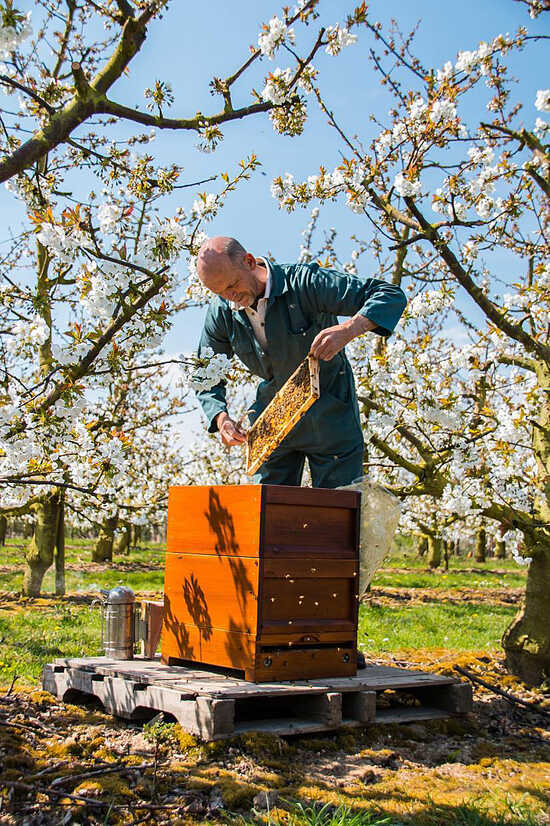Beekeepers are pivotal in fostering a climate-resilient future. They support the environment by caring for honey bees. Through the cultivation of various flowers and plants, they enrich the local greenery and supply nourishment for honey bees and other pollinators. Additionally, beekeepers serve as an early warning system; difficulties faced by honey bees often indicate broader ecological threats. Therefore, the time-honored practice of beekeeping, combined with ongoing research and technological advancements, is vital for promoting sustainability.
In two new podcast episodes of the Water & Land Podcast by the Centre for Agricultural History (CAG) and the Centre for Intangible Heritage Netherlands (KIEN), experts, researchers, and heritage practitioners discuss the ways in which beekeeping and biodiversity can contribute to a climate-resilient landscape.
Beekeeping: Then and Now
In this episode, we delve into the craft of beekeeping. How has this form of intangible cultural heritage evolved over the past decades? And what exactly is this 'early warning system' of the beekeeper? The art of beekeeping, a craft that has existed for thousands of years, faces great challenges today. Worldwide, bees are dealing with diseases, pests, and other threats that affect their populations. Of the more than 350 bee species in the Netherlands and Flanders, more than half are at risk of disappearing. This is concerning because these pollinating insects are indispensable for the reproduction of both plants and our food crops.
Beekeepers Ellen Danneels, Geert Meersdom, and René De Backer explain in this episode how they actively take measures to stop the extinction of bees and the decline of pollinators.
Listen to the episode 'Beekeeping: then and now' (in Dutch)
Beekeeping: Inspired by biodiversity
In a bee-friendly environment, a good 'flowering arch' is essential. But what exactly is a ‘good flowering calendar’, and how does it help honey bees and wild bees coexist in harmony? These questions are central in the podcast episode, in which Aat Rietveld and Ellen Danneels explain how they are committed to a bee-friendly world by promoting the flowering arch.
Listen to the episode 'Beekeeping: then and now' (in Dutch)
A picture of a beekeeper and his bees. Copyright Albert Reynaer via KonVIB
About the podcastseries Water & Land
The Water & Land podcast series stems from a similarly named, multi-year, and international collaboration project between CAG and KIEN. In three project years, Water & Land approaches three contemporary themes closely connected to each other: water management, biodiversity conservation, and soil fertility.
Without pretending that intangible heritage provides the solution, old techniques and practices can provide enriching insights. We collaborate with various heritage communities in Flanders and the Netherlands who contribute to a sustainable future with their inspiring example practices. We exchange experience and expertise and thereby provide new solutions.
The results of this project are shared in lectures, publications, and podcast episodes. Curious about the other podcast episodes? Then visit the Water & Land website. There you will find the earlier podcast episodes we made about, among other things, water mills, water mill landscapes, and grassland irrigation. Or visit the SoundCloud page of CAG, where you can listen to all episodes at once.
Visit the Water & Land website (in Dutch)
Visit the CAG SoundCloud page (all podcast episodes are in Dutch)